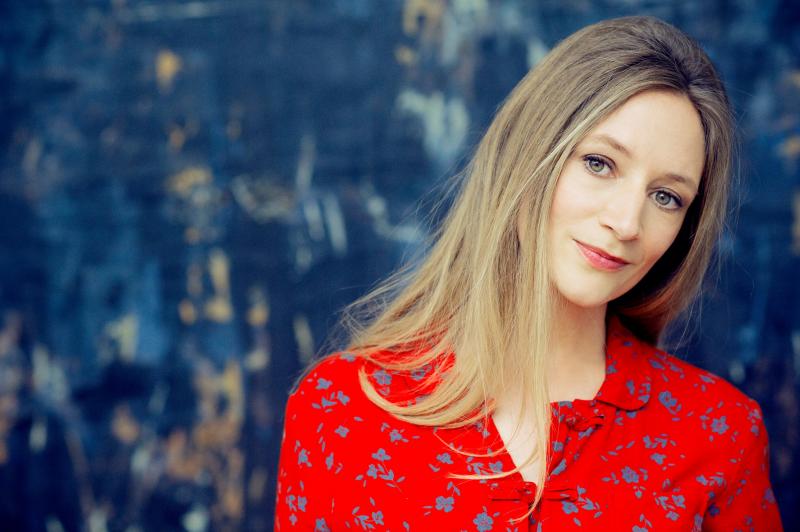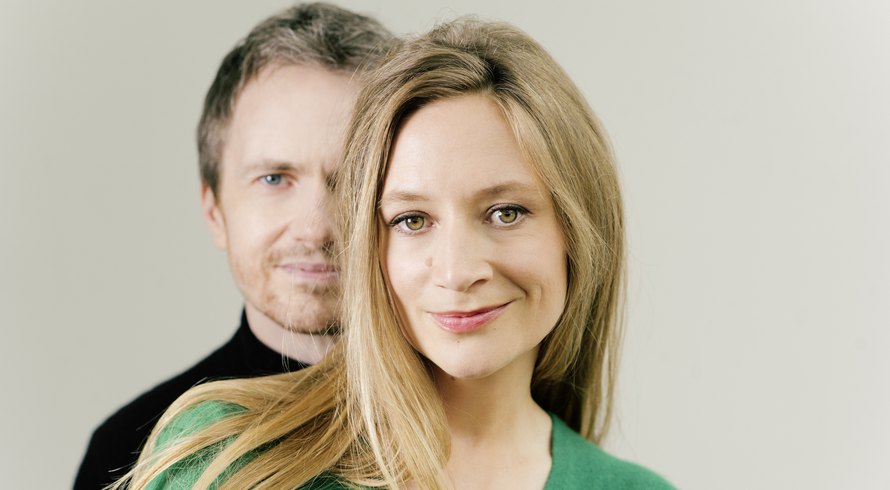Devieilhe, Tharaud, Wigmore Hall review - French soprano attracts young audience | reviews, news & interviews
Devieilhe, Tharaud, Wigmore Hall review - French soprano attracts young audience
Devieilhe, Tharaud, Wigmore Hall review - French soprano attracts young audience
Debussy brings joy...and disappointment

Soprano Sabine Devieilhe (pronounced Devielle) and pianist Alexandre Tharaud are both well on their way to becoming "Monuments Nationaux" in France.
The appeal of Devieilhe’s singing is instantly understandable. She graduated with flying colours from the Paris Conservatoire in 2011, and her first album, of Rameau, won several major awards. Theartsdesk reviewer of her UK debut, at Glyndebourne in 2015, as Fire and The Nightingale in Ravel’s L'Enfant et les Sortilèges described her cannily as “perfectly stratospheric”, and she has indeed remarked that what people were initially drawn to in her singing was its “instrumental quality” and what she describes as the “légèreté d’accroche” in her voice. With Devieilhe, lyricism, wonderful control and agility, and unbelievably clean intonation are absolute givens, and they often influence the choice of repertoire.
Thus, in the ten songs from Debussy which formed the backbone of the Wigmore Hall programme, the choices veered towards the early compositions, written when the composer was in thrall to the soprano Marie Vasnier. So the first half began with "Nuit d’Étoiles", Debussy’s first published song from 1880, and ended with the last of the songs written for Vasnier, the complex “Apparition”, a Mallarmé setting from 1884. Debussy marks the hushed ending of “Apparition”, "et en allant toujours se perdant" (keeping on losing oneself as one goes). The hushed evocation the scented falling stars was magical, and Deveilhe’s ethereal held high B flat was unforgettable.
Debussy also brought, for me, the biggest disappointment of the evening. Alexandre Tharaud (pictured below with Devieilhe by Jean-Baptiste Millot) has arranged Prélude à l'après-midi d'un faune for solo piano. He has published this arrangement (with Les Editions Henry Lemoine) and it appears on Le Poète du Piano, one of his twenty recordings for Erato. I have heard Tharaud in other contexts where he shines more brightly, notably an evening dedicated to the singer-songwriter Barbara where he was music director/ pianist/ second actor in a two-hander with Juliette Binoche at the Philharmonie. I came away from his reading of Faune with the impression that there are plenty of other pianists who would search out and find more of the tingle of anticipation and more colours in this piece.  The Wigmore has such a glorious history with French song in general and Debussy in particular. In the basement corridor is a framed handbill from 1928 for a gala to mark the tenth anniversary of the composer’s death, with the soprano Ninon Vallin singing. Vallin’s recordings are a reminder that the tradition in this repertoire is to give every word – and there are always a lot of them – its full meaning and value, whereas for Devieilhe it was the cello first, and then the voice. It is interesting that Deveilhe has recently taken the very wordy Poulenc’s La Courte Paille into her repertoire. The best of these was her impassioned interpretation of the last song, “Lune d’Avril”, a reminder that she has performed Constance in the Dialogues of the Carmelites.
The Wigmore has such a glorious history with French song in general and Debussy in particular. In the basement corridor is a framed handbill from 1928 for a gala to mark the tenth anniversary of the composer’s death, with the soprano Ninon Vallin singing. Vallin’s recordings are a reminder that the tradition in this repertoire is to give every word – and there are always a lot of them – its full meaning and value, whereas for Devieilhe it was the cello first, and then the voice. It is interesting that Deveilhe has recently taken the very wordy Poulenc’s La Courte Paille into her repertoire. The best of these was her impassioned interpretation of the last song, “Lune d’Avril”, a reminder that she has performed Constance in the Dialogues of the Carmelites.
We also heard Ravel’s Cinq mélodies populaires grecques. Whereas Devieilhe employed some overt stage-setting – a hand on hip for “Quel Galant m’est incomparable”, and singing both the beginning and the end of “Chanson des cueilleuses de lentisques” into the lid of the piano to gain the advantage of the resonance – the overall impression was one of dream and detachment rather than directness or earthiness.
One genuine surprise was how young many of the Wigmore Hall audience for this concert were. Mainly because of its policy of free streaming – and also the reduced-price ticket scheme for under-35’s – a whole new young audience has been drawn to the hall (the older core audience still seems to be more reticent) and as the evening progressed people, started to show their appreciation more vociferously.
Their first audible cheers came after a section of relatively unknown songs by the composer Louis Beydts who is mainly known for the two dozen film scores he wrote in the interwar period. His Chansons d’Oiseaux to poems by Paul Fort were first performed in 1950. They are somewhat formulaic, with each of the four of them ending up predictably with a crowd-pleasing head-voice escapade. They suit Devieilhe to a T.
Devieilhe is unbeatable at what she does best: her encores were operatic extracts: the "Fire" music from L'Enfant et les Sortilèges in memory of her first UK appearance, and “Viens, hymen” from Rameau's Les Indes Galantes... because of the (contested) assertion that Rameau is the father of French music. Both the encores were cheered to the roof.
rating
Explore topics
Share this article
The future of Arts Journalism
You can stop theartsdesk.com closing!
We urgently need financing to survive. Our fundraising drive has thus far raised £49,000 but we need to reach £100,000 or we will be forced to close. Please contribute here: https://gofund.me/c3f6033d
And if you can forward this information to anyone who might assist, we’d be grateful.

Subscribe to theartsdesk.com
Thank you for continuing to read our work on theartsdesk.com. For unlimited access to every article in its entirety, including our archive of more than 15,000 pieces, we're asking for £5 per month or £40 per year. We feel it's a very good deal, and hope you do too.
To take a subscription now simply click here.
And if you're looking for that extra gift for a friend or family member, why not treat them to a theartsdesk.com gift subscription?
more Classical music
 Cho, LSO, Pappano, Barbican review - finely-focused stormy weather
Chameleonic Seong-Jin Cho is a match for the fine-tuning of the LSO’s Chief Conductor
Cho, LSO, Pappano, Barbican review - finely-focused stormy weather
Chameleonic Seong-Jin Cho is a match for the fine-tuning of the LSO’s Chief Conductor
 Classical CDs: Shrouds, silhouettes and superstition
Cello concertos, choral collections and a stunning tribute to a contemporary giant
Classical CDs: Shrouds, silhouettes and superstition
Cello concertos, choral collections and a stunning tribute to a contemporary giant
 Appl, Levickis, Wigmore Hall review - fun to the fore in cabaret and show songs
A relaxed evening of light-hearted fare, with the accordion offering unusual colours
Appl, Levickis, Wigmore Hall review - fun to the fore in cabaret and show songs
A relaxed evening of light-hearted fare, with the accordion offering unusual colours
 Lammermuir Festival 2025, Part 2 review - from the soaringly sublime to the zoologically ridiculous
Bigger than ever, and the quality remains astonishingly high
Lammermuir Festival 2025, Part 2 review - from the soaringly sublime to the zoologically ridiculous
Bigger than ever, and the quality remains astonishingly high
 BBC Proms: Ehnes, Sinfonia of London, Wilson review - aspects of love
Sensuous Ravel, and bittersweet Bernstein, on an amorous evening
BBC Proms: Ehnes, Sinfonia of London, Wilson review - aspects of love
Sensuous Ravel, and bittersweet Bernstein, on an amorous evening
 Presteigne Festival 2025 review - new music is centre stage in the Welsh Marches
Music by 30 living composers, with Eleanor Alberga topping the bill
Presteigne Festival 2025 review - new music is centre stage in the Welsh Marches
Music by 30 living composers, with Eleanor Alberga topping the bill
 Lammermuir Festival 2025 review - music with soul from the heart of East Lothian
Baroque splendour, and chamber-ensemble drama, amid history-haunted lands
Lammermuir Festival 2025 review - music with soul from the heart of East Lothian
Baroque splendour, and chamber-ensemble drama, amid history-haunted lands
 BBC Proms: Steinbacher, RPO, Petrenko / Sternath, BBCSO, Oramo review - double-bill mixed bag
Young pianist shines in Grieg but Bliss’s portentous cantata disappoints
BBC Proms: Steinbacher, RPO, Petrenko / Sternath, BBCSO, Oramo review - double-bill mixed bag
Young pianist shines in Grieg but Bliss’s portentous cantata disappoints
 theartsdesk at the Lahti Sibelius Festival - early epics by the Finnish master in context
Finnish heroes meet their Austro-German counterparts in breathtaking interpretations
theartsdesk at the Lahti Sibelius Festival - early epics by the Finnish master in context
Finnish heroes meet their Austro-German counterparts in breathtaking interpretations
 Classical CDs: Sleigh rides, pancakes and cigars
Two big boxes, plus new music for brass and a pair of clarinet concertos
Classical CDs: Sleigh rides, pancakes and cigars
Two big boxes, plus new music for brass and a pair of clarinet concertos
 Waley-Cohen, Manchester Camerata, Pether, Whitworth Art Gallery, Manchester review - premiere of no ordinary violin concerto
Images of maternal care inspired by Hepworth and played in a gallery setting
Waley-Cohen, Manchester Camerata, Pether, Whitworth Art Gallery, Manchester review - premiere of no ordinary violin concerto
Images of maternal care inspired by Hepworth and played in a gallery setting
 BBC Proms: Barruk, Norwegian Chamber Orchestra, Kuusisto review - vague incantations, precise laments
First-half mix of Sámi songs and string things falters, but Shostakovich scours the soul
BBC Proms: Barruk, Norwegian Chamber Orchestra, Kuusisto review - vague incantations, precise laments
First-half mix of Sámi songs and string things falters, but Shostakovich scours the soul

Add comment